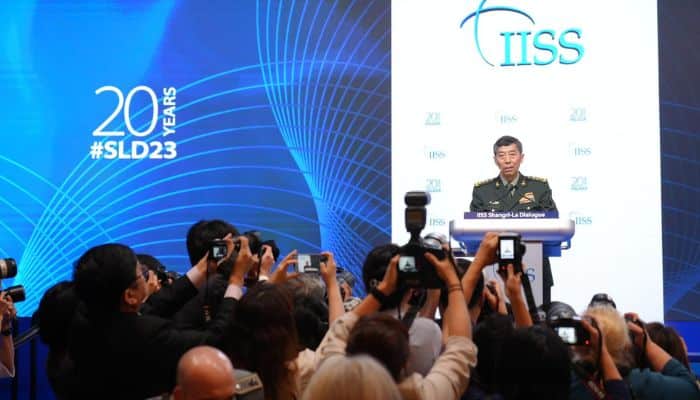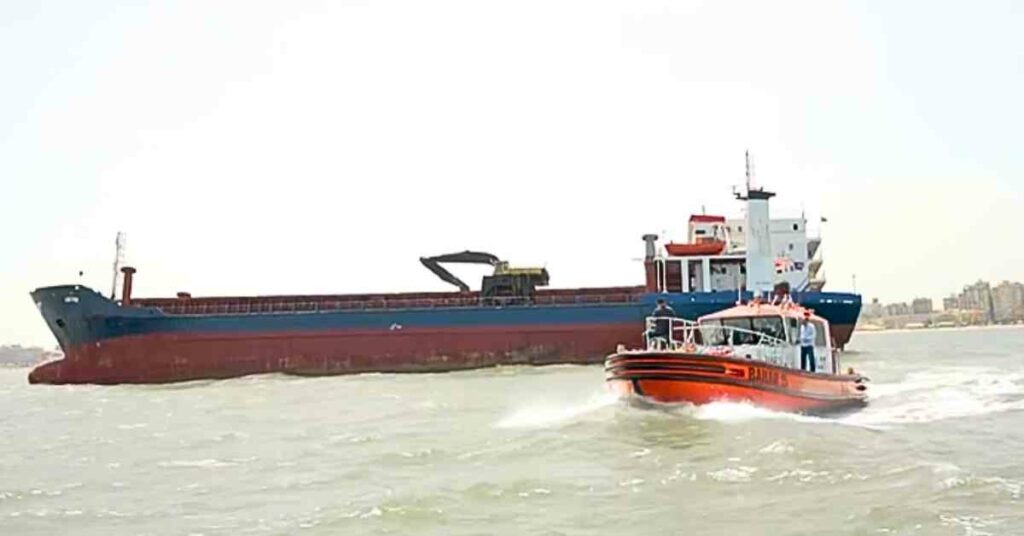‘Mind Your Own Business’- China’s Defense Minister On Warship Incident With U.S Destroyer
China’s Minister of National Defense reportedly warned foreign powers to avoid operating aircraft and warships close to the country’s territorial waters and blamed Washington for provocative encounters between the Chinese and the US units.
Gen. Li Shangfu spoke at the IISS Shangri-La Dialogue in Singapore on Sunday. Here, he singled out a Western policy he referred to as the “hegemony of navigation” as the provocation for the incident that took place on Saturday in the Taiwan Strait between USS Chung-Hoon (DDG-93), a guided-missile destroyer, and CNS Suzhou (132), a People’s Liberation Army Navy’s guided-missile destroyer, during a transit in the Taiwan Strait.

The ideal way to avoid such incidents was for fighter jets and naval vessels of countries not to conduct “close in actions” around territories of other countries, he mentioned.
He asked the reason for going there and added that for China, he always suggests minding one’s own business and taking proper care of vessels, fighter jets, territorial airspace, and waters. Following that would not result in future problems. I said this in response to questions after his speech, “China’s New Security Initiatives.”
China takes the Taiwan Strait as an internal waterway and sovereign territory, requiring permission for any warship to transit. Similarly, China claims sovereignty over major portions of the South and East China Sea, which are international waters and airspace according to international law. The People’s Liberation Army dispatches fighter aircraft and warships routinely to intercept foreign military aircraft and ships based on violations of Chinese territory.
Earlier in his speech, Li mentioned that other nations used freedom of innocent passage and navigation as a pretext to exercise the hegemony of navigation. The US and allies send out aircraft and warships on freedom of navigation missions that test what Washington refers to as extreme territorial claims. Beijing has called U.S. FONOps in the South China Sea provocative and destabilizing.
Multiple intercept incidents involved surveillance aircraft of the US, Canada, and Australia with China’s fighter aircraft, wherein the actions of China’s aircraft were considered unsafe.
For its part, China’s aircraft and warships routinely carry out operations close to the territorial waters of neighbouring nations like the Philippines and Japan. In the past, China’s warships have exercised the right of innocent passage via US territorial waters in the Aleutians Islands of Alaska. Under innocent passage, warships can sail via territorial waters at no notice so long as it isn’t prejudicial to the peace, good order, or security of the coastal state, per the UN Law of the Sea Convention’s Article 19.
Li’s speech was his first-ever address to an international audience since he was appointed Minister of the National Defense on 12 March. He spoke a little about China’s new security initiatives, save for a minimal mention of China’s Global Security Initiative (GSI) that was declared in February.
In the question and answer session, Li stated on the GSI that he was part of meetings with relevant defence officials of 11 nations during the Shangri-La Dialogue, and they had agreed that militaries must have more extensive and more profound interactions.
Li’s speech followed a pattern of past Chinese speeches at the Shangri-La Dialogue that criticized the US indirectly by referring to it as “some country” that created trouble. China was committed to peaceful development. Li reiterated the red line of the People’s Liberation Army in Taiwan.
If anyone tries separating China and Taiwan, the Chinese military will not be hesitant for a second. The country won’t fear opponents and resolutely secure national sovereignty and territorial integrity; Li made it clear.
He said Beijing was open to military-to-military communication between US and Chinese forces. The countries and their respective militaries had smooth communication channels at lower levels. Still, China had its principles concerning communication in that exchanges and communication had to be based on mutual respect without sharing further details.
Lloyd Austin, the US Secretary of Defense, and Adm. John Aquilino, the US Indo-Pacific commander, have said several times that there is a lack of communication between the defence establishments of China and the US. On Saturday, Austin asked China to have an open and direct communication channel between the defence and military leaders of the two countries.
Neither Austin nor Li held discussions in the Shangri-La Dialogue. They met on the sidelines briefly for a handshake.
References: Business Insider, USNI News, Breaking Defense
Disclaimer :
The information contained in this website is for general information purposes only. While we endeavour to keep the information up to date and correct, we make no representations or warranties of any kind, express or implied, about the completeness, accuracy, reliability, suitability or availability with respect to the website or the information, products, services, or related graphics contained on the website for any purpose. Any reliance you place on such information is therefore strictly at your own risk.
In no event will we be liable for any loss or damage including without limitation, indirect or consequential loss or damage, or any loss or damage whatsoever arising from loss of data or profits arising out of, or in connection with, the use of this website.
Disclaimer :
The information contained in this website is for general information purposes only. While we endeavour to keep the information up to date and correct, we make no representations or warranties of any kind, express or implied, about the completeness, accuracy, reliability, suitability or availability with respect to the website or the information, products, services, or related graphics contained on the website for any purpose. Any reliance you place on such information is therefore strictly at your own risk.
Do you have info to share with us ? Suggest a correction
About Author
Marine Insight News Network is a premier source for up-to-date, comprehensive, and insightful coverage of the maritime industry. Dedicated to offering the latest news, trends, and analyses in shipping, marine technology, regulations, and global maritime affairs, Marine Insight News Network prides itself on delivering accurate, engaging, and relevant information.

About Author
Marine Insight News Network is a premier source for up-to-date, comprehensive, and insightful coverage of the maritime industry. Dedicated to offering the latest news, trends, and analyses in shipping, marine technology, regulations, and global maritime affairs, Marine Insight News Network prides itself on delivering accurate, engaging, and relevant information.
Latest Shipping News Articles You Would Like:
Subscribe To Our Newsletters
By subscribing, you agree to our Privacy Policy and may receive occasional deal communications; you can unsubscribe anytime.









